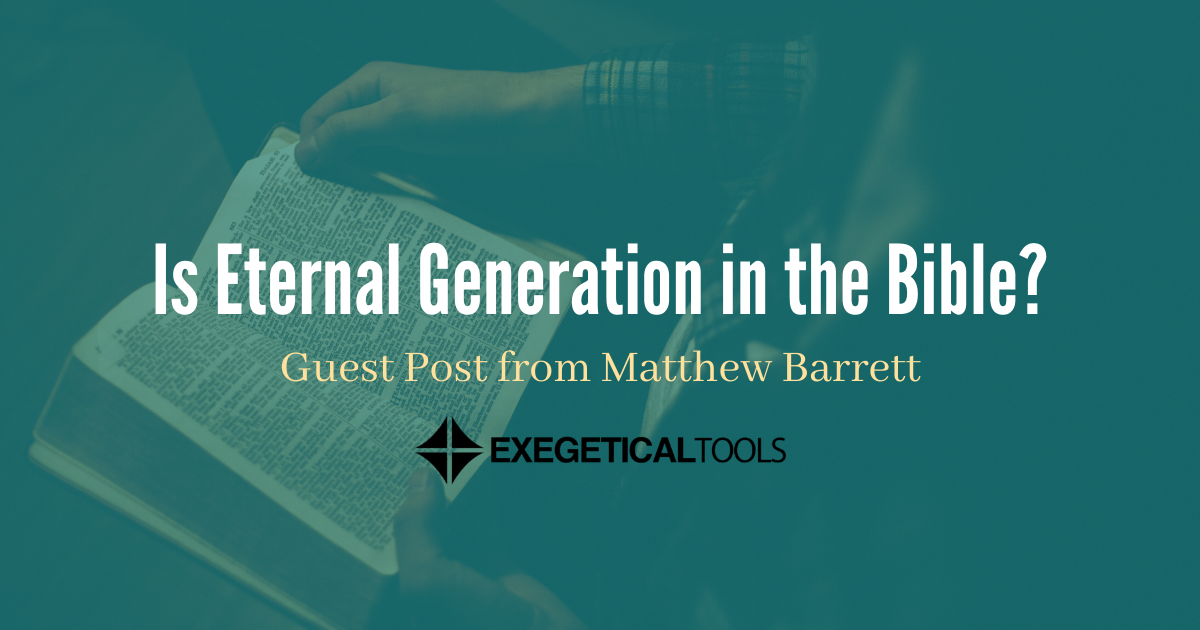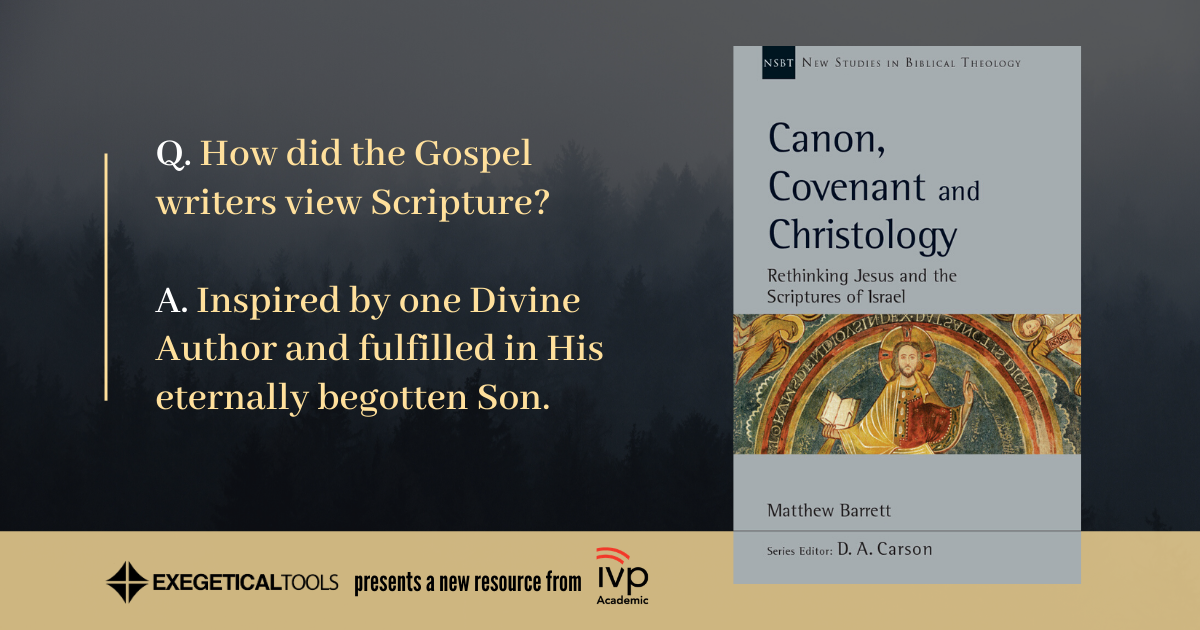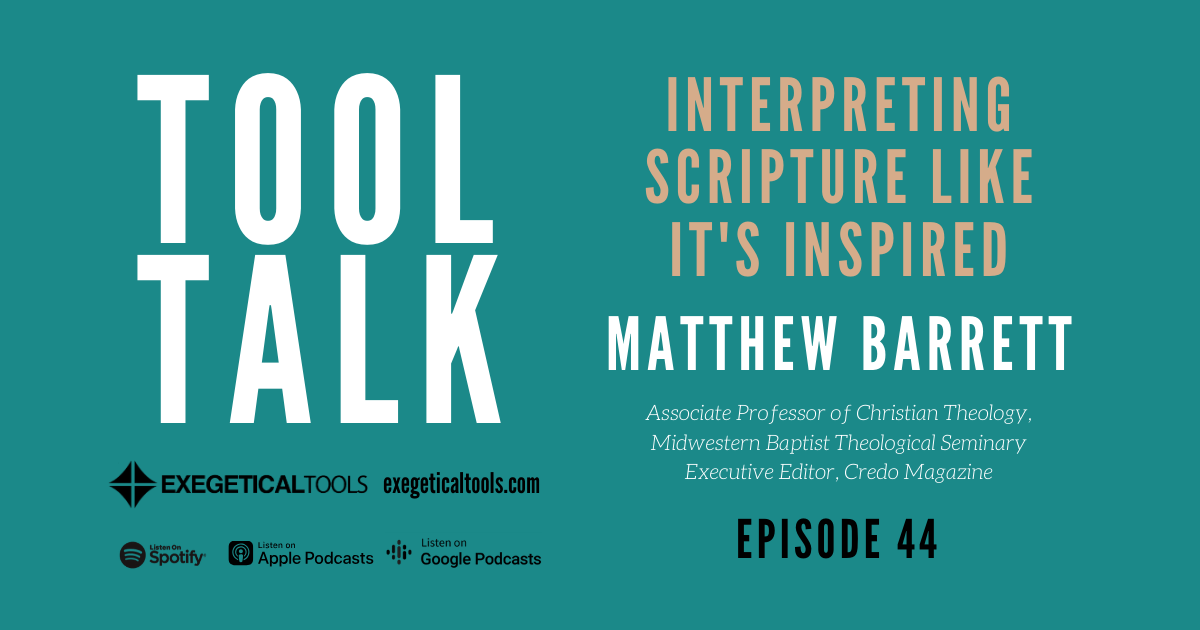Editor’s Note: The following is an excerpt from Matthew Barrett’s Canon, Covenant and Christology: Rethinking Jesus and the Scriptures of Israel, new from IVP Academic. The excerpt has been edited for brevity.
What does it mean for Jesus to be the ‘Son of God’?
In John 3, that title refers primarily to Jesus as the Messiah and Davidic king. This use of the title is common in the Gospels and the rest of the New Testament. However, in John 1 and 5 we see that this same title can be used to refer to Jesus as the eternal Son begotten from the Father.
Remember, John says at the opening of his Gospel not only that this Word “was made flesh, and dwelt among us,” but “we beheld his glory, the glory as of the only begotten of the Father,” who is “full of grace and truth” (John 1:14). In John 5 Jesus’ prerogative to work on the Sabbath is grounded in his eternal origin from the Father. The Jews hear this and understand Jesus to be “calling God his own Father, making himself equal with God” (5:18).
Notice, John and Jesus’ use of Son language is not divorced from John’s concept of the Logos. As the eternal Son from the Father, the one who is equal in divinity to the Father, this Son can become incarnate and in doing so become the ‘perfect Revealer’ of the Father, that is, the Word.
This point cannot be emphasized enough.
Recognizing Jesus to be the eternal Son from the Father is the basis on which we can then affirm him to be the supreme revelation, the Word, of the Father, not vice versa. The Word did not become Son, as if divine sonship starts with the incarnation (this is no adoptionist Christology).[1] Instead, the eternal Son became incarnate to reveal the Father to the world. The ontological always grounds the functional in Christology. “Sonship precedes messiahship and is in fact the ground for the messianic mission.”[2] Never was there a time when the Father was without his Word, and at the appointed time the Word was revealed to the world so that he might in turn reveal God to the world (John 1:18).
What does it mean that Jesus has 'life in Himself'? John 5 and Eternal Generation Click To TweetJohn 5:26 bears this out.
In 5:16-19 Jesus both accepts and challenges the charge of the religious leaders. On the one hand, he is teaching no ditheism as they think; rather than a second, challenging and independent deity, Jesus is one who “can do nothing of his own accord, but only what he sees the Father doing” (5:19a). On the other hand, that does not preclude his divine equality with the Father: “For whatever the Father does, that the Son does likewise” (5:19b). His affirmation of both only continues as he draws out implications for salvation and judgment in 5:20-29. It reaches a climax in 5:26, where again both are seen: “For as the Father has life in himself, so he has granted the Son also to have life in himself.”
What might Jesus mean?
Life in himself refers to the divine attribute of aseity. As the self-existent, self-sufficient, infinite and eternal God, the Creator in no way depends on something or someone external to himself, such as his creation or his creatures. Put positively, he not only has but is life in and of himself.[3] To claim such aseity from the Father in 5:26 is just as bold a claim to deity as 5:17 (“My Father is working until now, and I am working”), though perhaps with an even greater sense of lucidity. In context, it is on this basis that Jesus can then claim to give eternal life to those whom the Father has given to him (5:25).
But notice, the life Jesus has in himself is given to him by the Father, who has life in himself: “For as the Father has life in himself, so he has granted the Son also to have life in himself” (5:26). While that may appear to be a contradiction, it is not. Keep in mind, this is the eternal God in view. The granting of life is, says Augustine, an eternal, timeless reality. Building on Augustine, Carson labels it an “eternal grant”:
It is not as if there is a moment when God granted to the Son to have life in himself, before which the Son did not have life in himself. If such were the case, then whatever it was that the Son was granted could not have been divine, independent, self-existent life.
Carson concludes:
[T]his grant does not establish a certain time in chronological sequence when the grant took place; rather, if it is an eternal grant, it establishes the nature of the Father-Son relationship. In short, this is a way of establishing the eternal generation of the Son.[4]
What Carson calls an eternal grant, the early Church Fathers labelled an eternal generation, a concept presupposed throughout John’s Gospel whenever Jesus or John speak of the Son’s eternal origin from the Father.[5] While the Father is unbegotten, the Son is eternally begotten by the Father. In other words, the Son is generated from the Father in eternity. For that after all is what it means to be the Son. To put it theologically, the one divine essence eternally subsists in three persons so that each person of the Godhead is wholly divine. Yet the persons are distinct according to their eternal relations of origin: paternity (the Father is eternally unbegotten), filiation (the Son is eternally begotten) and procession (the Spirit is eternally spirated).
This technical vocabulary by Nicene exegetes captures the same ‘both-and’ dynamic described in John 5, where Jesus asserts his divine equality while simultaneously confirming his distinct personhood (e.g. 5:17-19). He is, as Nicaea so famously said, “true God from true God, begotten not made; of the same essence as the Father.”[6]
Why mention 5:26 and eternal generation?
Not only does Jesus’ statement balance monotheism while distinguishing between trinitarian persons, but this eternal grant or eternal generation is a strong testimony to the full, absolute deity of the Son. In short, Jesus is claiming not to have been made a Son at the incarnation, but to be the eternal Son from the Father, eternally receiving from the Father life in himself. Again, Nicaea says it best when it describes the Son as “the Only-begotten from the Father, that is from the substance of the Father.”[7]
What stronger indication could Jesus possibly give to his divine identity and eternal origin?
Listen to Barrett discuss his new book on Tool Talk:
Taken from Canon, Covenant and Christology by Matthew Barrett. Copyright (c) 2020 by Matthew Barrett. Published by InterVarsity Press, Downers Grove, IL. www.ivpress.com
[1] D. A. Carson, Jesus the Son of God: A Christological Title Often Overlooked, Sometimes Misunderstood, and Currently Disputed (Crossway, 2012). 41.
[2] George E. Ladd, A Theology of the New Testament (Eerdmans, 1974), 167. Also see Stephen J. Wellum, God the Son Incarnate: The Doctrine of Christ (Crossway, 2016), 158-165.
[3] Matthew Barrett, None Greater: The Undomesticated Attributes of God (Baker Books, 2019), 55-69.
[4] D. A. Carson, “John 5:26: Crux Interpretum for Eternal Generation,” in Retrieving Eternal Generation (Zondervan, 2017), 82.
[5] See my forthcoming work on the Trinity, to be released in 2021.
[6] Jaroslav Pelikan and Valerie R. Hotchkiss, eds., Creeds & Confessions of the Faith in the Christian Tradition, vol. 1 (Yale University Press, 2003), 153.
[7] Ibid. 159.



